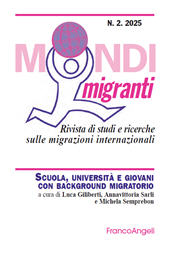I figli e le figlie dell'immigrazione nell'istruzione e formazione professionale : tra scelte obbligate e spazi di autodeterminazione
99-121 p.
Il presente contributo propone alcune riflessioni sociologiche nate da un'indagine che ha voluto esplorare le traiettorie educative di un gruppo di studenti e studentesse con background migratorio, iscritti all'istruzione e formazione professionale. La ricerca ha indagato le dinamiche che determinano la scelta dell'istruzione professionale da parte di alcune famiglie di origine immigrata, cercando di comprendere le motivazioni che rendono tale percorso una strada, in molti casi, obbligata. In particolare, il presente articolo, si interroga su come tale percorso venga oggi interpretato. Pur rappresentando spesso una chance canalizzata (Romito, 2016), l'istruzione e formazione professionale propone esperienze che sembrano potersi evolvere in opportunità di agency e autodeterminazione per i giovani e le giovani con background migratorio (Pozzebon, 2020). In tal senso si è voluto indagare se questa popolazione studentesca possa risignificare l'istruzione e formazione professionale ancora
percepita "scuola di serie B", nobilitando una forma di educazione che è stata storicamente stigmatizzata. [Testo dell'editore]
This paper aims to analyze the results of a social research that explored the educational trajectories of a group of students with migrant backgrounds, enrolled in two vocational schools in Genoa. The research explored the reasons that determine the choice of vocational education by some families of immigrant background, trying to understand the motivations that make this path a choice, in many cases, obligatory. In particular, the investigation questions how this choice is experienced: whether it continues to represent a channeled opportunity (Romito, 2016), or whether it is evolving into an opportunity for agency and self-determination for youngsters with migrant backgrounds (Pozzebon, 2020). In this sense, we wanted to investigate whether they can re-signify vocational education and training still perceived as a "second-class school," ennobling a form of education that has been historically stigmatized. [Publisher's text]
Is part of
Mondi migranti : 2, 2025-
Articles from the same issue (available individually)
-
Information
ISSN: 1972-4896
DISCIPLINES
KEYWORDS
- istruzione e formazione professionale, popolazione studentesca con background migratorio, agency, alternanza scuola lavoro
- vocational education and training, student population with migrant background, agency, school-to-work alternation


